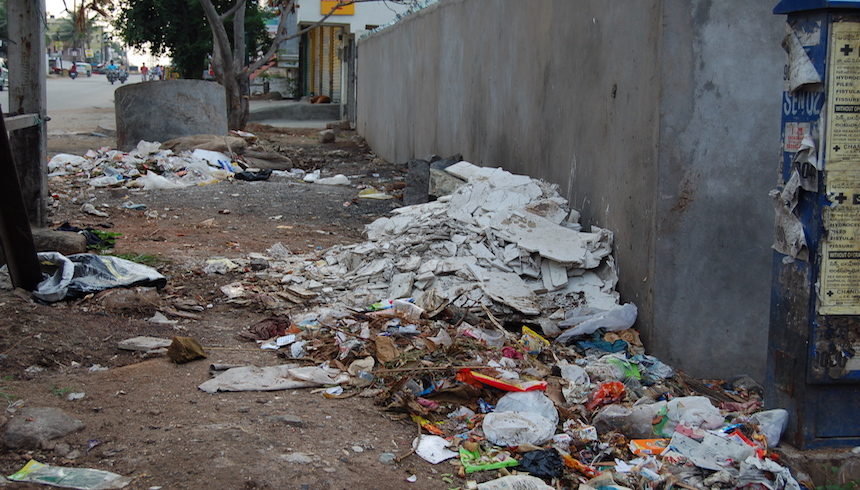Garbage and Infrastructural issues keep Bengaluru away from Smart City tag
In a short span of time, Bengaluru city has come to be known as ‘Garbage City’ from ‘Garden City.’ Neither did the government nor did the citizens give much thought to the deteriorating waste management in the city that has been defacing not just its grandeur but also people’s health. Apart from this, Bengaluru suffers from infrastructural issues and roads filled with potholes.
Things got grimmer in 2012, when residents of Mandur and Mavallipura refused to allow their landfills from being used as hefty amounts of garbage was being dumped in these areas going beyond the landfill’s capacity. Also, Bruhat Bengaluru Mahanagara Palike had dumped 1200 tonnes of waste at terra firma, a privately owned landfill that had a capacity of holding just 400 tonnes of waste.
BBMP had suggested total ban in the use of plastic in 2012. However, while plastic continued to be used, it was only in 2016 that BBMP zeroed in on two new places, Mitaganahalli and Bellahalli where they set up new landfills after spending money. However, the residents refused to allow their neighborhood to be used as dumping ground as they did not want to be another Mandur.
The pile of waste that was being burnt has damaged their health and has polluted lakes, rivers, streams, air etc., as it emits highly toxic carcinogenic air. Given the mounts of waste that was being dumped, it was right of the people to refuse to allow their land to be used as dumping ground. After all, having a clean environment is one of the most basic rights guaranteed under the Indian Constitution
In 1999 Supreme Court had appointed a committee that made Recommendations for the Modernisation in the Solid Waste Management in the country.
Mandatory Recommendations were:
- No waste shall be thrown on roads, footpaths, open spaces, drains or water bodies.
- Waste shall be segregated at source and stored in two bins. One for biodegradable waste/food waste and one for recyclable waste like plastics, papers, metals, glass, rags etc.
- Domestic, trade and institutional waste/biodegradable waste shall be collected from the doorstep or community bin on a daily basis.
- Recyclable waste material can be collected from time to time as notified by local body as they do not decay.
- Domestic hazardous/toxic waste materials shall be deposited in special bins as provided by the local bodies.
In order to ensure that the recommendation of segregating municipal solid waste is followed effectively, Municipal Solid Wastes ( Management & Handling) Rules, 2000 was framed, under which municipal authorities were to also organise awareness programmes.
However, quite reprehensibly, none of the recommendations were implemented effectively.
16 years after Supreme Court made those mandatory recommendations, there are areas in Bengaluru now that follow segregation of waste at source. This was after BBMP refused to collect waste until it was segregated. However, sadly enough there are still households in certain areas that do not follow waste segregation and even if they do, it is mixed in the trucks that collect the waste making the entire effort futile.
Bengaluru is in a dire need to have successful implementation of various short term and long term measures. It needs the citizens to actively take part in the measures in order to deal with the garbage problem.
Some of the methods of treating waste that can be promoted and followed are as follows:
Composting:
One of the best solutions to this menace is to not create garbage at all. This is why composting is so important. Organic waste such as food, plant, animal wastes, soiled papers can be treated this way. The decomposition of this waste creates brown material that is rich in nutrients for plant growth. Finished compost is a soil additive that increases the water retaining capacity of the soil and augments the overall structure. Following this process would not just reduce the waste considerably but could also be used to make beautiful greenery within your homes. An easy way of composting at home can be found here, https://www.youtube.com/watch?v=-7IM5sWl9GY
This process is being rigorously promoted in United States as urban areas in US are suffering from a huge solid waste disposal problem.
Incineration:
It is the process of controlled burning of waste which significantly reduces the volume of the waste. This way the amount of waste reduces drastically though it does not completely render the landfill useless as landfills would have to be used to dump the residual waste.
Gasification:
It is the process that converts carbonaceous materials such as coal, petroleum, plastic, bio fuels, bio mass into carbon monoxide and hydrogen gas. The process is conducted at more than 700 degree celcius with minimal oxygen in order to avoid combustion. Carbon monoxide combines with the steam to make carbon dioxide which is used in gas turbines to create electricity or as diesel or fuel.
Recycling:
It is one of the most popularly promulgated method as it reduces the amount of dump immensely and saves a lot of energy as well. For example, making of cans from a used bottle saves 95% of the energy. There is a lot one can do to adopt recycling of waste:
- One has to make a conscious effort to buy things that are recyclable like tin jars or glass.
- As much as possible, one must buy stuff that is recycled in order to encourage recycled items.
- Donate as much as possible instead of binning it. This way one can donate their bit to charity as well.
Sweden as an example:
99% of the households in Sweden recycle all their wastes in one way or the other. It has lead to a revolution leading to a situation wherein Sweden has now run out of waste! Recycling stations are no more than 300 metres away from home. Households at Sweden separate newspapers, plastics, hazardous wastes, bulbs, food waste etc. Newspapers are recycled into paper mass, plastic are reused or melted into new items, food waste is composted. The trucks that collect waste run on recycled energy or fuel, left over medicines are accepted by pharmacists.
Waste treatment is so efficient and profitable at Sweden that they import 700,000 tonnes of waste from other countries. This has only been possible because of honest officials and because the people, companies, hotels and all other institutions in Sweden have co-operated with the Government and municipal bodies.
The ominousness of solid waste management can only be prevented when the process of treating/reducing waste starts from every household. There is little that can be done to improve the situation without complete involvement of all citizens. In order to have effective implementation, the officers need to be sensitised of the gravity of the situation, so they would take the lead to spread the message to the people of their jurisdiction. It is time each and every one is sensitised about the thriving menace before it defeats us.
In order to ensure this, it is said that BBMP is planning to have direct involvement of all the senior BBMP officials including BBMP Commissioner, N.Manjunath Prasad who will be given one ward each to ensure proper garbage disposal. This is expected to work wonders as they would be incharge of the wards they reside in so will have to take care of their own residential surroundings.
Infrastructural improvements needed to make Bengaluru, a Smart City:
Apart from employing waste management processes that creates benefit and wealth, there are several other areas that Bengaluru needs to look into for its overall development as a smart city. Some of them are:
- Preservation of the lakes that have lately been debased with no concern.
- Development of satellite towns around the city that would prevent migration of people into the city.
- Our Chief Minister, Bengaluru Development Minister and all the MPs of Karnataka must take initiative and apprise the Prime Minister/Railway Minister and concerned officials about the need for speedy implementation of Suburban railway system that connects Tumkur, Kengeri, Bidadi, Whitefield, Yelahanka, Doddaballapur, Chikkaballapur, Nelamangala etc., The surburban railway system would discourage use of two wheelers and four wheelers. This would reduce traffic drastically and decongest the city.
- Carpooling needs to be seriously implemented in order to reduce pollution.
- The city needs better parks, roads and well maintained medians under public-private partnership as most of the parks in the city like the park opposite Lalbagh etc are poorly maintained and not well lit.
- Parks at residential/commercial areas, junctions, road medians must be adopted and maintained by corporate companies, apartment associations, business establishments, community halls, professionals like Doctors, Engineers, Chartered Accountants, Advocates etc. Such proposals must be cleared under Single window scheme in order to encourage more such citizens to come forward to take up the development, maintenance and beautification of their surroundings in order to make Bengaluru look clean and appealing.
- Buildings must be constructed according to approved layout plan. Deviation should not be allowed.
- Green Belts need to be preserved and no construction must be undertaken in green belt areas in order to preserve lung space and keep the environment clean and green.
- Akram Sakram scheme should not be allowed as it leads to haphazard development of the city, water logging, drainage issues, and other such infrastructural problems.
- Rain water harvesting and water conservation must be made mandatory in order to increase the water table etc.
- Cement roads must be laid so that the issue of potholes is done away with once for all for atleast 40-50 years. This has to be undertaken with proper co-ordination of BBMP, BWSSB, BESCOM and other concerned civic bodies.
- Stringent penalties must be laid down for spitting/urinating on the road etc. In order to curb this menace, proper public toilet facilities should be provided under public-private partnership all over the city.
- Footpaths must not be encroached by street vendors as in many places they cause hindrance to the pedestrains.
- Hoardings, banners, poster etc., of birthday wishes of their leaders, welcoming netas, movie releases etc. must be banned. Stringent penalty must be levied on the wrongdoers in order to prevent defacement of the public property and to preserve the beauty of the city.
- Technologically advanced dustbins for both wet waste as well as dry waste shall be placed all over the city to prevent littering of roads, promoting waste segregation at source and hygiene. An initiative for which has already been taken up by the Embassy Group in association with an IT company in certain areas.
- Use of metro travel must be encouraged by providing feeder services, parking facilities for two wheelers and four wheelers at metro station in order to decongest the city roads and to keep Bengaluru free from air and noise pollution.
- Metro train frequency shall be increased from 10 minutes to 5 minutes and train timings shall be extended from the present 10 PM to 11:30 PM.
- There have been innumerable deaths in the ambulance due to traffic snarls. It is high time we make our roads ambulance friendly.
A conscious effort to follow these would bring Bengaluru a long way forward and definitely help Bengaluru achieve the Smart City tag.
However, none of this would be possible unless all officers of BBMP work diligently towards the goal. The comprehensive issue of corruption needs to be nipped from the bud.
The ouster of IAS officer, Subodh Yadav is a deplorable example of the presence of corruption and mafia force that thrives in the city of Bengaluru. Subodh Yadav was spearheading the task of getting the city rid of the mounts of waste. In fact he had even reduced the number of trucks carrying waste from each ward, which frustrated the corporators as the more number of trucks go out from wards, the more bills can be made.
He was abruptly transferred in the midst of all his initiatives as the Secretary of Karnataka Public Service Commission. This is the price he paid for trying to break the garbage contractors’ lobby. There have been several people who have protested the transfer of an officer who was so diligent and was trying to make the system transparent.
We hope conscious efforts are made to bring Subodh Yadav back as we need committed officers like him to lead the citizens.
Honest officials, prevention of corrupt practices and sensitisation of citizens is important for implementing all these measures. Over all, these measures cover all the major implementations that are needed to solve both garbage issues as well as infrastructural woes. Therefore, hope steps are undertaken to fulfil them as soon as possible.
Picture Courtesy: Wikimedia








There Are 2 Comments